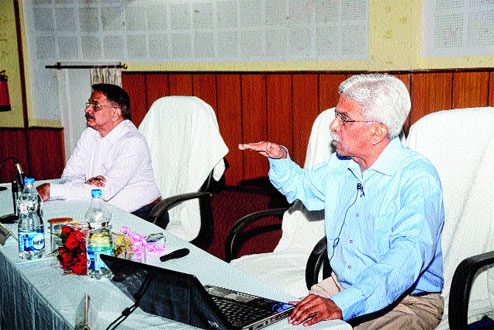Seven doctors from the Kurji Holy Family Hospital in Digha arrived at St Xavier's College last Tuesdayto conduct a blood donation camp.
Present at the camp were also students from the St Xavier's College of Management and Technology. By the time the camp closed, a total of 40 students had donated blood.
The doctors, grateful to the teachers and students, praised the management for motivating the participants.
Jitendra Singh, one of the students, said: "Blood donation is an unique collaboration of modern medical science and humanity. Anybody can have an emergency and be in urgent need of blood."
Another student, Gaurav Kumar, said: "I believe it is the moral responsibility of every healthy person to donate blood time to time so that the blood banks have sufficient units available to deal with emergencies. It is the least we can do to help a person we do not even know."


Message of peace
Last week was a busy one for St Xavier's College and St Xavier's College of Management and Technology. The institution organised a seminar on religious fundamentalism the day after the blood donation camp on the campus.
Ram Punyani, a former biomedical engineering faculty member at IIT-Bombay, was the chief guest.
Addressing the students and teachers, Punyani said: "Countries where the process of secularisation is substantial, religion remains in the bylanes of society. It is a more personal matter."
A former senior medical officer affiliated with IIT-Bombay, Punyani has been travelling extensively to different parts of the country, spreading the message of peace and unity through his lectures, publications, workshops and meetings.
Education partners
Patna Women's College have signed a memorandum of understanding (MoU) with the Indo-European Education Foundation.
The organisation, which has its headquarters at Vistula University, Poland, has almost all European colleges as partners.
Sister Marie Jessie, the Patna Women's College principal, and physics faculty Aprajita Krishnan have been invited to deliver lectures on information and communication technology for decision making on e-management in higher education and spectroscopic characterisation of Asokan pillars and archaeological artefacts, respectively, during the International Staff Week at Vistula University. They left for Warsaw on Sunday for the lecture series that started on Monday. It would conclude on March 27.

Women’s College education department. Picture by Ashok Sinha and Ranjeet Kumar Dey
Decade flies by
The education department of Patna Women's College celebrated India on its 10th anniversary last Thursday. Nalanda Open University vice-chancellor Rash Bihari Prasad Singh was the chief guest, while legislator Kiran Ghai graced the occasion as the guest of honour.
The students started the event with a welcome dance and song after which the alumni members walked down memory lane. Close to 250 students watched a PowerPoint presentation on the department's development over the past 10 years.
Later, the students performed giddha (folk dance of Punjab), dandiya and a skit, Diwarein gira do, among other acts to spread the message of women empowerment.
College principal Sister Marie Jessie said: "Ten years is a long journey and we have covered it with dignity and pride. The students' dedication and determination, the teachers' style is the reason for the department's success."
Shweta, an alumni, said: "It felt great to return to the college and meet my old friends. Together, we cherished our old days."
Economics talk
Development economist Pulapre Balkrishnan on Saturday spoke to Chandragupt Institute of Management, Patna, students on the effects of inflation on the country's growth rate.
Speaking at a seminar on "Macroeconomics reversal in India", Balkrishnan, the recipient of the Malcolm Adiseshiah Award for distinguished contribution to development studies (2014), analysed for the students the different aspects of growth and inflation in the country's industrial and agricultural sector.
At present, a faculty member at the Centre for Development Studies in Thiruvananthapuram, Kerala, he said: "Growth rates over the past 10 years have been affected by persisting high inflation. The period between 2003-04 and 2012-13 may be divided into two more or less equal phases - the first being a period of high growth with low inflation and the second of low growth with high inflation. In an unexpected macroeconomic reversal, India's growth rate started sliding and settled at less than 5 per cent in 2012-13. At the same time, inflation shifted gears and surged forward."
Balkrishnan's research spans the inflationary process in the Indian economy, productivity growth in manufacturing to economic growth in India. Focusing on the problems of accounting for global financial crisis, he said: "Growth in India has been less than the rest of the world because the country's share in world trade is lower. So, the revenue from exports in its gross domestic product (GDP) was also lower."
Concluding his lecture, he said factors in macroeconomic reversal were a cause of concern for every person. He said: "My objective is to convey the importance of economic theory in understanding its workings. Households and businesses care deeply about inflation, employment and other economy-wide variables for these determine the opportunities available to them for maintaining their standard of living."
Want to report some event in your college? Tell ttbihar@abp.in










